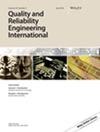Deep learning the Hurst parameter of linear fractional processes and assessing its reliability
IF 2.8
3区 工程技术
Q3 ENGINEERING, INDUSTRIAL
引用次数: 0
Abstract
This research explores the reliability of deep learning, specifically Long Short‐Term Memory (LSTM) networks, for estimating the Hurst parameter in fractional stochastic processes. The study focuses on three types of processes: fractional Brownian motion (fBm), fractional Ornstein–Uhlenbeck (fOU) process, and linear fractional stable motions (lfsm). The work involves a fast generation of extensive datasets for fBm and fOU to train the LSTM network on a large volume of data in a feasible time. The study analyses the accuracy of the LSTM network's Hurst parameter estimation regarding various performance measures like root mean squared error (RMSE), mean absolute error (MAE), mean relative error (MRE), and quantiles of the absolute and relative errors. It finds that LSTM outperforms the traditional statistical methods in the case of fBm and fOU processes; however, it has limited accuracy on lfsm processes. The research also delves into the implications of training length and valuation sequence length on the LSTM's performance. The methodology is applied to estimating the Hurst parameter in li‐ion battery degradation data and obtaining confidence bounds for the estimation. The study concludes that while deep learning methods show promise in parameter estimation of fractional processes, their effectiveness is contingent on the process type and the quality of training data.深度学习线性分数过程的赫斯特参数并评估其可靠性
本研究探讨了深度学习(特别是长短期记忆(LSTM)网络)在估计分数随机过程的赫斯特参数方面的可靠性。研究重点关注三类过程:分数布朗运动(fBm)、分数奥恩斯坦-乌伦贝克(fOU)过程和线性分数稳定运动(lfsm)。这项工作涉及快速生成大量 fBm 和 fOU 数据集,以便在可行的时间内对大量数据进行 LSTM 网络训练。研究分析了 LSTM 网络 Hurst 参数估计在各种性能指标方面的准确性,如均方根误差 (RMSE)、平均绝对误差 (MAE)、平均相对误差 (MRE),以及绝对误差和相对误差的定量。研究发现,在 fBm 和 fOU 过程中,LSTM 的性能优于传统统计方法;但在 lfsm 过程中,LSTM 的准确性有限。研究还深入探讨了训练长度和估值序列长度对 LSTM 性能的影响。该方法被应用于估算锂离子电池降解数据中的赫斯特参数,并获得估算的置信区间。研究得出结论:虽然深度学习方法在分数过程的参数估计方面大有可为,但其有效性取决于过程类型和训练数据的质量。
本文章由计算机程序翻译,如有差异,请以英文原文为准。
求助全文
约1分钟内获得全文
求助全文
来源期刊
CiteScore
4.90
自引率
21.70%
发文量
181
审稿时长
6 months
期刊介绍:
Quality and Reliability Engineering International is a journal devoted to practical engineering aspects of quality and reliability. A refereed technical journal published eight times per year, it covers the development and practical application of existing theoretical methods, research and industrial practices. Articles in the journal will be concerned with case studies, tutorial-type reviews and also with applications of new or well-known theory to the solution of actual quality and reliability problems in engineering.
Papers describing the use of mathematical and statistical tools to solve real life industrial problems are encouraged, provided that the emphasis is placed on practical applications and demonstrated case studies.
The scope of the journal is intended to include components, physics of failure, equipment and systems from the fields of electronic, electrical, mechanical and systems engineering. The areas of communications, aerospace, automotive, railways, shipboard equipment, control engineering and consumer products are all covered by the journal.
Quality and reliability of hardware as well as software are covered. Papers on software engineering and its impact on product quality and reliability are encouraged. The journal will also cover the management of quality and reliability in the engineering industry.
Special issues on a variety of key topics are published every year and contribute to the enhancement of Quality and Reliability Engineering International as a major reference in its field.

 求助内容:
求助内容: 应助结果提醒方式:
应助结果提醒方式:


